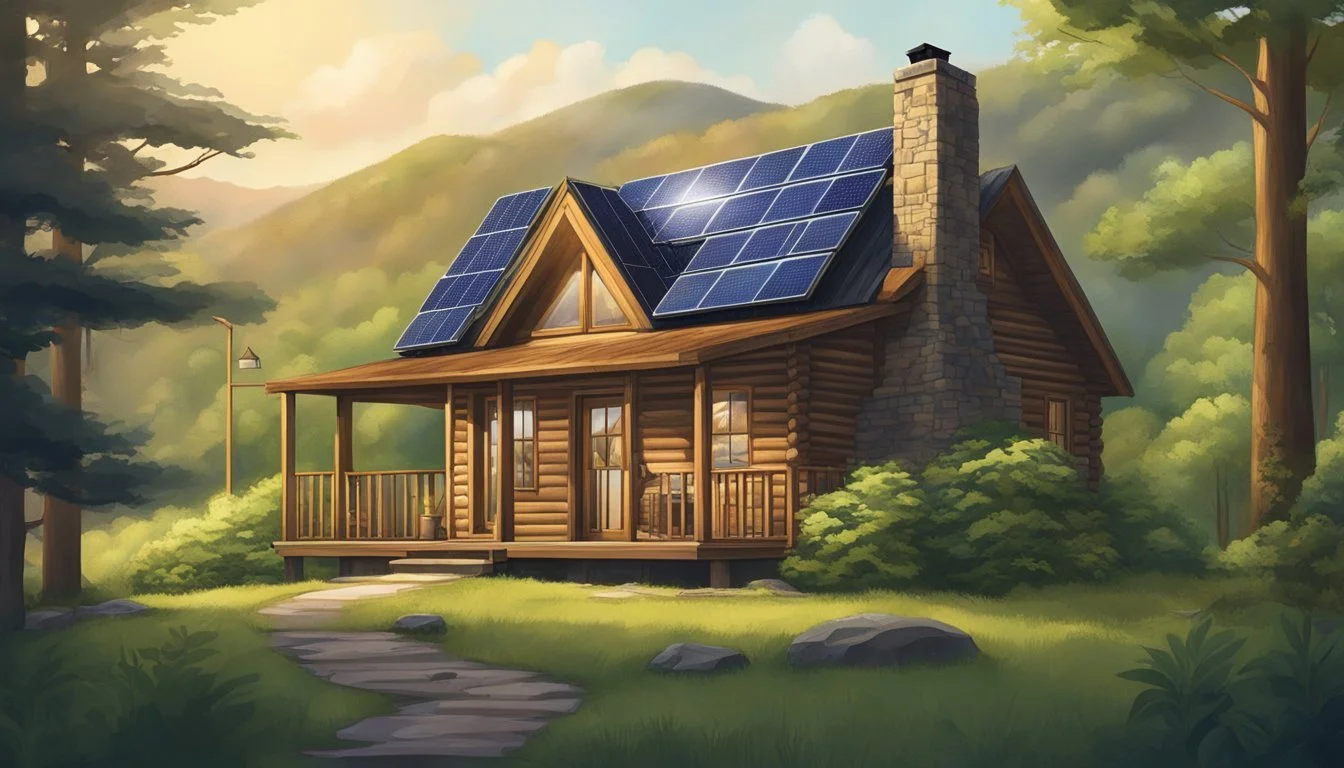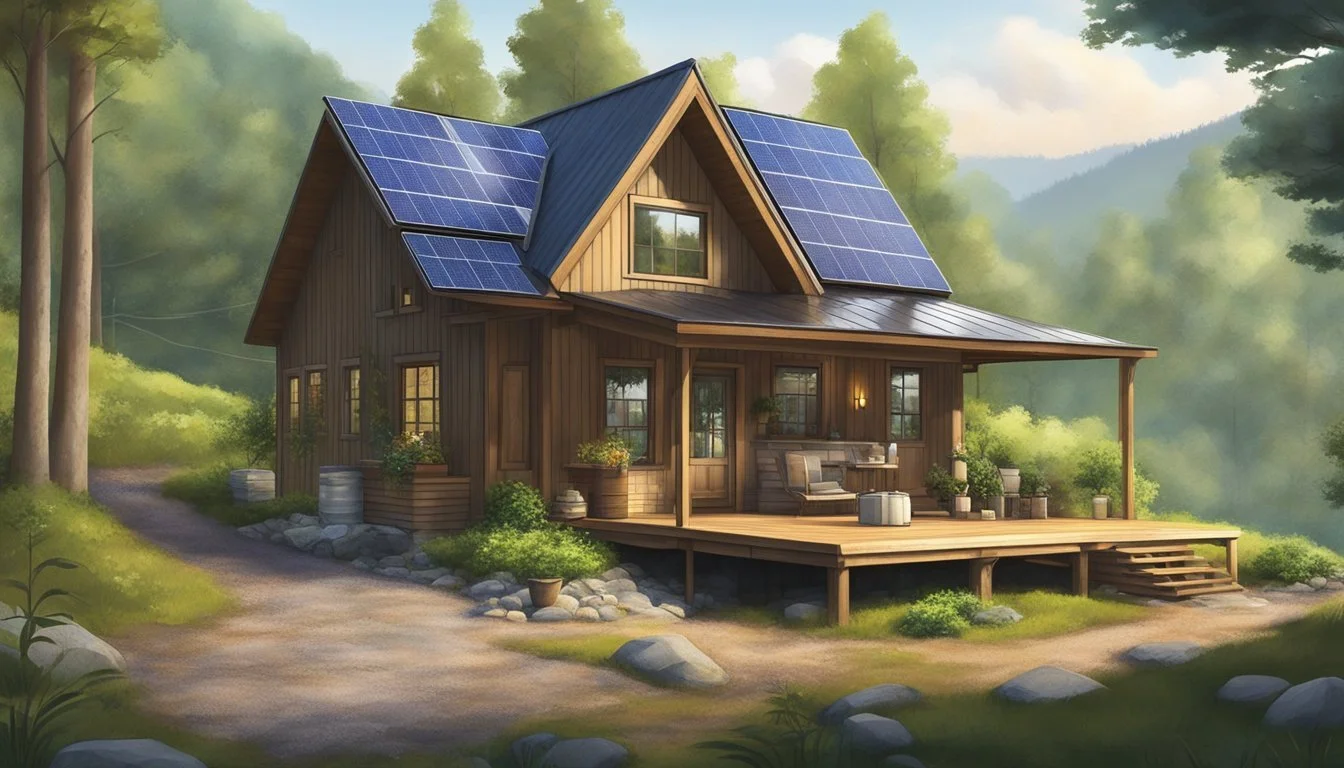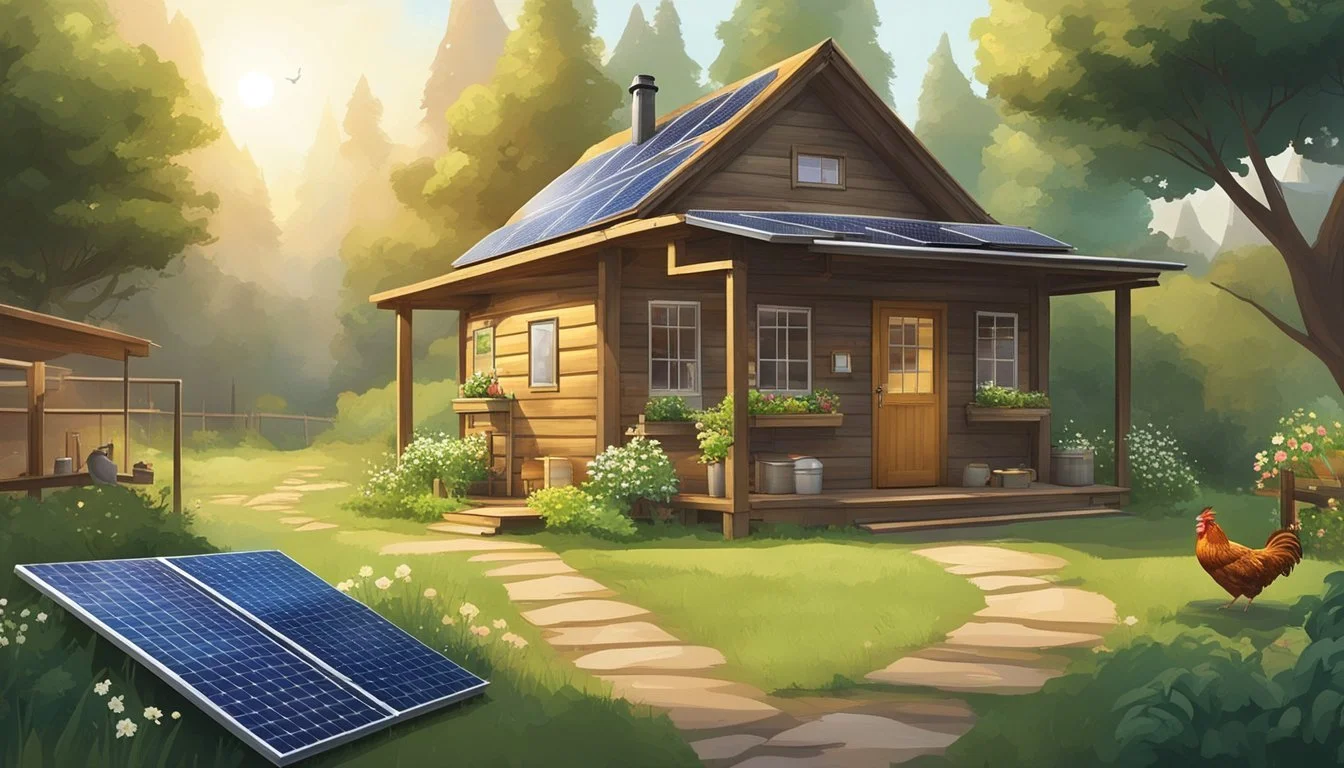How to Live Off Grid in Tennessee
A Comprehensive Guide for Sustainable Living
This Article is Part of Our Guide on Living Off-Grid for all 50 US-States
Tennessee, known as the Volunteer State, is an attractive location for those looking to embrace off-grid living in the United States. With its diverse landscape, mild climate, and relatively affordable cost of living, it offers an appealing environment for individuals and families seeking a sustainable and self-sufficient lifestyle.
In Tennessee, the cost of living is roughly 13% lower than the national average, making it an economical choice for off-grid living. Prospective off-gridders can expect to pay significantly less for housing, transportation, groceries, and utilities, while healthcare services may cost slightly more. Meanwhile, finding suitable off-grid land for sale in the state is achievable, with a variety of properties available across different terrains and price ranges.
However, it is essential to be aware of local laws and regulations regarding off-grid living in Tennessee. For example, the state's laws stipulate that sewage disposal systems must be connected to public sewers when accessible, thus potentially limiting the ability to go entirely off-grid in some areas. Nonetheless, with proper planning and consideration of applicable legal requirements, aspiring off-gridders can successfully establish an off-grid lifestyle in Tennessee.
Understanding Off-Grid Living in Tennessee
Legal Considerations
When planning to live off-grid in Tennessee, it is essential to be aware of the laws and regulations governing off-grid living. Tennessee law states that, on any lot or premise accessible to the sewer, no other method of sewage disposal should be employed. This means that if you live somewhere near a sewer hookup, you will not legally be able to go completely off-grid. Healthcare services may cost around 2% more in Tennessee, but overall, the cost of living is about 13% less than the national average.
Zoning Laws and Building Codes
Zoning laws and building codes play a significant role in off-grid living in Tennessee. The state has several counties, such as Morgan County, Cannon County, Polk County, Chester County, and Lawrence County, which are favorable for off-grid living. These areas have low property taxes, relaxed zoning laws, and support for alternative building methods. However, property prices in some areas, like Rutherford County, might be higher than the state average.
The Climate Factor
The climate in Tennessee is generally mild, which is an important consideration for off-grid living. Its favorable weather conditions make it suitable for solar power generation. However, it's essential to keep in mind that Tennessee is also prone to tornadoes. Thus, when designing and constructing an off-grid home, it's crucial to implement precautions and construction methods that can withstand these extreme weather events.
In summary, understanding the legal requirements, zoning laws, building codes, and climate factors is crucial for living off-grid in Tennessee. Careful planning and consideration will help ensure a more sustainable and environmentally friendly lifestyle.
Finding the Right Location
When it comes to living off-grid in Tennessee, finding the right location is crucial. There are several factors to consider, such as proximity to cities, land prices, and population density. In this section, we will discuss these aspects and provide you with information on some of the best counties for off-grid living in Tennessee.
Rural vs. Near Cities
Living off the grid requires a balance between isolation and access to resources. Rural areas are often ideal for off-grid living as they offer lower population density, which can provide more privacy and space for self-sufficient homesteads. On the other hand, being near cities like Nashville, Knoxville, or Memphis can grant easier access to amenities, markets, and medical services.
Some of the best rural counties for off-grid living in Tennessee include:
Gibson County
Rutherford County
Franklin County
Lincoln County
Perry County
Wayne County
For those who prefer to be closer to urban areas while maintaining an off-grid lifestyle, consider counties like Marion, Polk, Morgan, and Chester.
Analyzing Land Prices
Land prices and property taxes play a significant role when choosing a location for off-grid living. In general, Tennessee's cost of living is around 13% lower than the national average, which can be beneficial for off-grid residents. However, land prices may vary depending on the county.
County Population Density Approximate Land Price per Acre Gibson Low Affordable Rutherford High Above State's Average Franklin Low Affordable Lincoln Low Affordable Perry Low Affordable Wayne Low Affordable Marion Low Affordable Polk Low Affordable Morgan Low Affordable Chester Low Affordable
Keep in mind that land prices are subject to change and can be influenced by factors such as proximity to urban areas, land quality, and available resources. Conduct thorough research and visit potential properties before making your decision.
Financial Considerations
Cost of Living Analysis
Living off-grid in Tennessee is a great idea for those looking for a cost-effective and sustainable lifestyle. The state offers a low cost of living compared to other states, primarily due to the relatively low cost of property and affordable essential services.
Expense Category Approx. Cost Property Price $3,000 to $5,000 per acre Solar Panel System $10,000 to $15,000 Septic System $3,000 to $5,000
It is important to note that property prices may vary depending on location, condition, and surrounding amenities. When it comes to energy generation, installing a solar panel system will be an initial investment, but it will eventually result in significant long-term savings.
Understanding Taxes
Living off-grid in Tennessee also offers the benefit of understanding taxes, and how they impact the overall financial situation. Here's a brief overview of the taxes that may be relevant to off-grid living in Tennessee:
Sales Tax: Tennessee has a relatively high state sales tax rate, at 7%. However, local sales tax rates can range from 1.5% to 2.75%, depending on the county, which makes the combined sales tax rate range from 8.5% to 9.75%. It is crucial to factor in the sales tax rate when purchasing items for your off-grid lifestyle.
Income Tax: One of Tennessee's most significant advantages is that it is one of the few states with no income tax on wages and salaries. Instead, the state has a tax on interest and dividends called the "Hall Income Tax," although the tax rate has been reduced over the years and is scheduled to be eliminated in 2023.
Property Tax: While living off-grid in Tennessee, property taxes will still apply. The property tax rate varies by county, but the statewide average is approximately 0.74% of the assessed property value. It is essential to consider property tax when selecting a location for your off-grid homestead.
Federal Tax Credit: Off-grid living often involves investments in systems like solar panels and other renewable energy sources. Homeowners may qualify for federal tax credits that offset some of the costs of these investments. Keep an eye on Federal Tax Credit programs to make the best financial decisions.
In conclusion, living off-grid in Tennessee can be a financially rewarding decision due to the low cost of living, no income tax, and the potential for federal tax credits on renewable energy investments. However, it is vital to account for sales and property taxes when planning your off-grid lifestyle.
Sustainability and Self-Sufficiency
Water and Energy Resources
Living off-grid in Tennessee requires a comprehensive understanding of available water and energy resources for a sustainable lifestyle. To ensure a reliable water supply, rainwater harvesting can be an efficient method. Tennessee experiences a relatively high amount of rainfall, providing an ample source of water for households. Another option is tapping into surface water resources, such as streams, rivers, and lakes. Regardless of the chosen water source, it is essential to install a good filtration system to protect against harmful contaminants and bacteria.
When it comes to power, solar energy is a popular choice for off-grid living. Tennessee gets an average of 204 sunny days per year, making it suitable for solar power generation. Installing solar panels can provide the necessary power supply for a self-sufficient lifestyle. Additionally, homeowners may also consider wind power as an alternative renewable energy source.
Farming and Food Production
Agriculture is another crucial aspect of sustainable living, as it plays a significant role in achieving a self-sufficient lifestyle. Tennessee offers fertile land and a long growing season, making it an ideal location for farming and food production.
Here are some key factors to consider in developing a sustainable farming system in Tennessee:
Choose crops suitable for the region's climate and natural resources, such as corn, soybeans, (how long do soybeans last?) and cotton.
Take advantage of the state's abundant wildlife for hunting and fishing, which can provide supplementary sustenance.
Engage in organic farming practices that minimize the use of harmful chemicals and pesticides, thereby protecting the environment.
Establish a home garden to grow a variety of vegetables, fruits, and herbs for daily consumption.
Plan crop rotation and intercropping techniques to improve soil fertility and maintain a healthy ecosystem.
Implementing these methods can positively impact the overall sustainability of an off-grid lifestyle while ensuring self-sufficiency in Tennessee.
Building and Development
Permits and Regulations
When planning to live off-grid in Tennessee, one must consider the permits and regulations required. The International Building Code applies throughout the state, but local jurisdictions may enforce additional requirements. Obtaining a building permit is an essential step, and applicants must provide detailed plans and documentation. It's important to be aware of any restrictions that could impact the off-grid lifestyle, such as the requirement of a sewage disposal system.
In Tennessee, if a property is accessible to the public sewer system, no other method of sewage disposal is allowed. However, in more rural areas, alternative waste disposal systems may be utilized. Checking for local regulations and restrictions on compost toilets can save you from potential legal issues. Keep in mind that land prices can vary, so researching your options and the area can help you make an informed decision.
Constructing Self-Sufficient Homes
Building a self-sufficient home requires careful consideration of various factors. While some areas in Tennessee have housing and building restrictions, there are still excellent options for off-grid living. For example, a tiny house must:
Be built on a minimum of 320 sq ft of land
Have a minimum size of 120 sq ft
Include at least one habitable room with a closet and an openable window
Maintain a ceiling height of at least 6'8"
In addition to meeting these regulations, a self-sufficient home should incorporate sustainable features and utilities. Some crucial aspects to consider include:
Energy: Solar panels, wind turbines, or hydropower systems can provide off-grid energy needs.
Water: Rainwater harvesting systems can be installed to collect and store water for daily usage. Wells or spring-fed water sources can also be viable options.
Heating and Cooling: Incorporating energy-efficient insulation, passive solar design, and efficient heating options like wood stoves can help maintain comfortable temperatures.
Living off-grid in Tennessee is an achievable goal with proper research and planning. By understanding the permits, regulations, and essential elements of constructing a self-sufficient home, you can take the steps needed to create your ideal off-grid lifestyle.
Safety and Community
When living off-grid in Tennessee, it's essential to consider safety and community involvement. This section will address dealing with natural disasters and joining off-grid communities in the state.
Dealing with Natural Disasters
Tennessee residents can face various natural disasters, including floods and droughts. To prepare for these events, off-grid dwellers should take specific precautions:
Floods: Pay attention to flood zones when selecting your off-grid property. Elevated areas and properties further from large rivers are less prone to flooding. Reinforcing your infrastructure with flood-resistant materials can also help mitigate potential damage.
Droughts: Implement a rainwater collection system to conserve water during dry periods. Investing in drought-resistant plants for gardening and landscaping can reduce water consumption.
In addition to floods and droughts, be aware of Tennessee's natural beauty, rich wildlife, and potential hazards. To better understand the local paths and waterways, engage with experienced neighbors and learn from their experiences.
Joining Off-Grid Communities
To ease your transition to off-grid living and learn from experienced individuals, consider joining an existing off-grid community. Some of the best places to live off-grid in Tennessee include Morgan County, Cannon County, Polk County, Chester County, and Lawrence County. These areas offer low property taxes, relaxed zoning laws, and a favorable climate for solar power.
Benefits of joining off-grid communities:
Shared knowledge and resources
Assistance with infrastructure development
Emotional and social support
Collaboration in tackling local challenges, such as crime
While the crime rate in Tennessee varies depending on the location, off-grid communities can form cooperatives to collaborate on security measures and develop a strong support network. Ensuring the safety of all members can involve organizing a neighborhood watch or investing in surveillance cameras.
Living off-grid in Tennessee can present challenges alongside a rewarding lifestyle. By preparing for natural disasters, joining off-grid communities, and contributing to a supportive network, off-grid dwellers can enhance their lives and embrace the adventure of living closer to nature.
Local Amenities and Services
Proximity to Medical and Educational Facilities
Living off the grid in Tennessee provides various options for residents to access medical and educational facilities. While most off-grid locations are in rural areas, some of these communities are within reasonable driving distance to larger cities such as Nashville, Memphis, and Knoxville. These cities offer hospitals, medical centers, and a wide range of educational institutions, including primary, secondary, and higher education options.
For off-grid residents who prefer to stay closer to their rural homes, local hospitals and clinics can be found in smaller, nearby towns. It is essential to research the area you are planning to live in to ensure access to necessary medical services. Additionally, homeschooling can be considered for education in remote locations where access to schools is limited.
Access to Markets and Supplies
As with most off-grid living situations, access to markets and supplies varies depending on the chosen location. Tennessee's southern parts are considered the best option for off-grid living, mainly due to the availability of natural resources like clean water and fertile soil for farming. When establishing an off-grid homestead, it is essential to consider the proximity to local markets or grocery stores for purchasing necessary supplies.
In rural Tennessee, residents may need to travel longer distances to reach supermarkets and general stores. However, many smaller towns have local farmers' markets, which provide fresh, locally sourced produce and other goods. These markets often serve as valuable resources for off-grid households.
While living off-grid often involves producing much of your own food and supplies, there will still be occasions when it is necessary to visit nearby towns and cities to purchase items and resources. As such, it is crucial to take transportation and accessibility into account when choosing your off-grid location in Tennessee.





